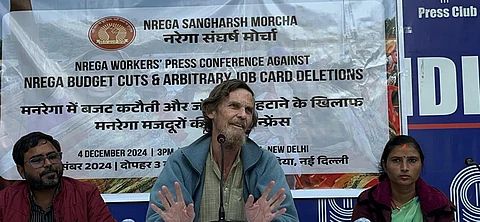

The ground reality of Mahatma Gandhi National Rural Employment Guarantee Scheme (MGNREGS) is very different from the picture painted by the Centre on the floor Parliament on December 3, renowned economist Jean Dreze said on December 4, 2024.
Dreze was speaking at a press conference organised by the NREGA Sangharsh Morcha. He stated that the claims made by the Government of India on increasing the scheme’s budget and taking action on corruption were misleading.
The National Democratic Alliance government has increased the NREGA budget annually by Rs 20,000 crore, Union Minister of State for Communications Chandrashekhar Pemmasani claimed during the ongoing winter session of Parliament. He added that deleting NREGA job cards was the responsibility of state governments.
Union Minister for Rural Development Shivraj Singh Chouhan has justified the stalling of funds to West Bengal since December 2021. The Centre has proof of large-scale corruption in the implementation of NREGA, said Chouhan.
The economist termed it a ‘grave injustice’ to MGNREGS workers. The government has taken active steps over the past 10 years to weaken the Mahatma Gandhi National Rural Employment Guarantee Act, 2005 (MNREGA), he added.
Pemmasani was misleading Parliament on Fund Transfer Orders (FTOs), Dreze commented while talking about timely payments claimed by the Centre. “As per the law, wages have to be paid within 15 days of task completion. The minister claimed FTOs were generated within 15 days. But he did not mention crediting of wages,” he explained.
Barely 50 per cent of workers will have received wages within the stipulated period if time is calculated from completion of jobs to crediting of payments into workers accounts.
Dipyaman Adhikary, member of Paschim Banga Khet Majoor Samity (PBKMS), refuted Chouhan’s claims. He said no officials had been held accountable. Nor had any kind of penalties been imposed.
“The NREGA Act does not authorise the denial of wages to workers due to implementation irregularities and indefinite suspension of the scheme,” he said, adding the rural development ministry should make its findings from the investigation public for transparency.
Afsana Khan, a NREGA worker from Jharkhand, said delay in wages and technological compulsion is discouraging workers from seeking employment.
He added that reduction of budget is also the reason for delay in payments as wages from the budget get allocated and carried forward in the following financial year.
“Some workers do not even receive wages,” he said.
Chakradhar Buddha from LibTech, an organisation of engineers, social workers and social scientists working to improve public service delivery in India, said the government should immediately revoke technological introductions. He cited the example of online attendance systems like National Mobile Monitoring System (NMMS) and Aadhar Based Payment System (ABPS) for payment.
“About 90 million workers have been deleted in 2022-23 and over 9.1 million workers have been deleted for non-compliance of ABPS in 2024-25. It is the responsibility of the central government, not states. These workers should be reinstated and the move is against the spirit of the Act,” Buddha said.
NREGA workers announced a two-day protest starting December 5 at Jantar Mantar.